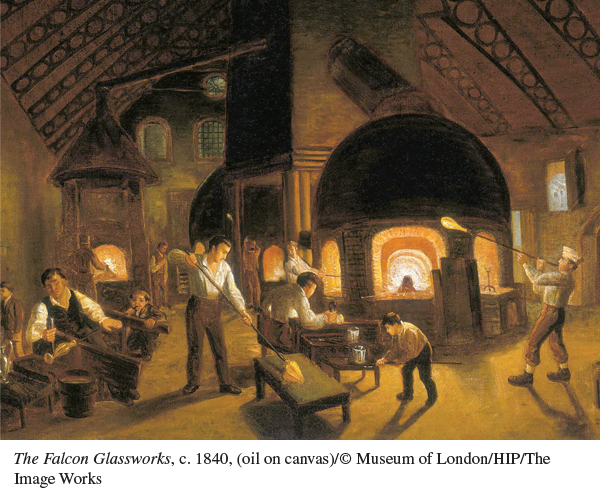A History of Western Society: Printed Page 648
A History of Western Society, Value Edition: Printed Page 621
A History of Western Society, Concise Edition: Printed Page 647
Introduction for Chapter 20
20
The Revolution in Energy and Industry
ca. 1780–1850
While revolutions in France and across the Atlantic were opening a new political era, another revolution was beginning to transform economic and social life. The Industrial Revolution took off around 1780 in Great Britain and soon began to influence continental Europe and the United States. Non-
Industrialization profoundly modified much of human experience. It changed patterns of work, transformed the social class structure and the way people thought about class, and eventually altered the international balance of political power. Quite possibly only the development of agriculture during Neolithic times had a comparable impact and significance.
What was revolutionary about the Industrial Revolution was not its pace or that it represented a sharp break with the previous period. On the contrary, the Industrial Revolution built on earlier developments, and the rate of progress was slow. What was remarkable about the Industrial Revolution was that it inaugurated a period of sustained economic and demographic growth that has continued to the present day. Although it took time, the Industrial Revolution eventually helped ordinary people in the West gain a higher standard of living as the widespread poverty of preindustrial Europe gradually receded.
Such fundamental transitions did not occur overnight. National wealth rose much more quickly than improvements in the European standard of living until about 1850. This was because, even in Britain, only a few key industries experienced a technological revolution. Many more industries continued to use old methods. In addition, wage increases were modest until the mid-

CHAPTER PREVIEW
Why did the Industrial Revolution begin in Britain, and how did it develop between 1780 and 1850?
How did countries in Europe and around the world respond to the challenge of industrialization?
How did work evolve during the Industrial Revolution, and how did daily life change for working people?
How did the changes brought about by the Industrial Revolution lead to new social classes, and how did people respond to the new structure?
Chronology
| ca. 1765 | Hargreaves invents spinning jenny; Arkwright creates water frame |
| 1769 | Watt patents modern steam engine |
| ca. 1780–1850 | Industrial Revolution; population boom in Britain |
| 1799 | Combination Acts passed in England |
| 1802–1833 | Series of Factory Acts passed by British government to limit the workday of child laborers and set minimum hygiene and safety requirements |
| 1805 | Egypt begins process of modernization |
| 1810 | Strike of Manchester cotton spinners |
| ca. 1815 | Western European countries seek to adopt British industrial methods |
| 1824 | Combination Acts repealed |
| 1829 | Stephenson’s Rocket, an early locomotive |
| 1830s | Industrial banks in Belgium |
| 1834 | Zollverein erected among most German states |
| 1842 | Mines Act passed in Britain |
| 1844 | Engels, The Condition of the Working Class in England |
| 1850s | Japan begins to adopt Western technologies; industrial gap widens between the West and the rest of the world |
| 1851 | Great Exhibition held at Crystal Palace in London |
| 1860s | Germany and the United States begin to rapidly industrialize |